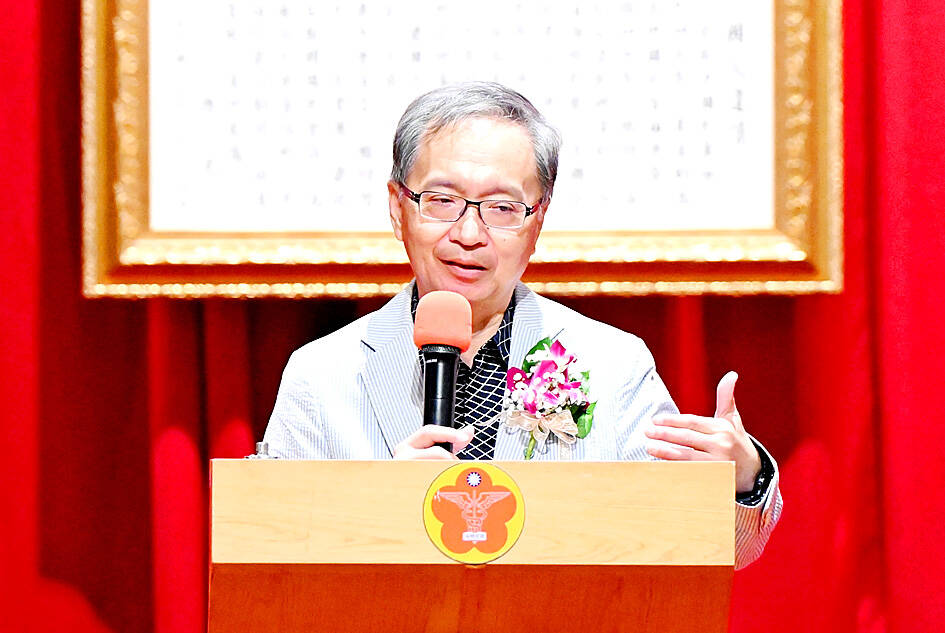Advance care planning consultation fees might be covered by the National Health Insurance (NHI) system starting next year, Minister of Health and Welfare Hsueh Jui-yuan (薛瑞元) said yesterday.
Hsueh made the remark during his opening speech at the Taiwan Academy of Hospice Palliative Medicine’s general assembly and academic seminar in Taipei.
Advance care planning refers to making decisions about healthcare preferences before becoming seriously ill, and sometimes involves creating a legal document to make sure that those wishes are carried out.

Photo: Chu Pei-hsiung, Taipei Times
To ensure that terminally ill patients receive dignified care, whether treated at home, a residential care facility or a hospital, the Ministry of Health and Welfare is looking at implementing three strategies, Hsueh said.
First, it is to discuss a plan to increase NHI benefits for at-home hospice and palliative medical teams, he said.
Second, the ministry encourages people to sign an advance directive form and a hospice and palliative care consent form, in line with the Patient Right to Autonomy Act (病人自主權利法) and the Hospice Palliative Medical Care Act (安寧緩和醫療條例), he said.
If one out of every 10 terminally ill people signed such forms, they would spend one day less in a hospital, which can sometimes save tens of thousands of dollars in medical expenses, he added.
However, a consultation service is usually required for signing an advance directive, which is about NT$2,000 to NT$3,000 (US$62.07 to US$93.11) per hour, Hsueh said, adding that the cost might hinder people’s willingness to complete the forms, Hsueh said.
Therefore, the ministry aims to include the fee for eligible people in the NHI coverage, but the NHI Committee must first approve it, he said, adding that the ministry would ask the NHI Administration to look at implementing the idea so it takes effect next year.
The third strategy is for hospice and palliative care to be included in the long-term care system, through the home-based primary healthcare program for people with disabilities, he said.
Hopefully, through the trust built between family physicians and at-home patients with disabilities, the patients would be willing to sign the advance directive form and the hospice and palliative care consent form, he added.
Hsueh said that as there are discussions about legalizing euthanasia, the ministry must review its hospice and palliative care policies and consider whether it has done enough to ensure that patients receive adequate healthcare.
The issue of euthanasia is also a challenge for healthcare workers, as it clashes with their core medical values of saving lives, he said, adding that the World Medical Association also opposes physicians taking part in euthanasia.
In other news, as the Cabinet approved a proposal to increase the monthly minimum wage to NT$27,470 next year, health insurance premiums for some people would also increase, the ministry said.
It said that its latest estimate showed that that the policy would affect the health insurance premiums of about 8.18 million people next year, with an average increase of NT$20 per month per person.
The NHI is expected to receive an increase of NT$5.2 billion from the increased health insurance premiums, it said.
Additional reporting by Lin Hui-chin

An essay competition jointly organized by a local writing society and a publisher affiliated with the Chinese Communist Party (CCP) might have contravened the Act Governing Relations Between the People of the Taiwan Area and the Mainland Area (臺灣地區與大陸地區人民關係條例), the Mainland Affairs Council (MAC) said on Thursday. “In this case, the partner organization is clearly an agency under the CCP’s Fujian Provincial Committee,” MAC Deputy Minister and spokesperson Liang Wen-chieh (梁文傑) said at a news briefing in Taipei. “It also involves bringing Taiwanese students to China with all-expenses-paid arrangements to attend award ceremonies and camps,” Liang said. Those two “characteristics” are typically sufficient

A magnitude 5.9 earthquake that struck about 33km off the coast of Hualien City was the "main shock" in a series of quakes in the area, with aftershocks expected over the next three days, the Central Weather Administration (CWA) said yesterday. Prior to the magnitude 5.9 quake shaking most of Taiwan at 6:53pm yesterday, six other earthquakes stronger than a magnitude of 4, starting with a magnitude 5.5 quake at 6:09pm, occurred in the area. CWA Seismological Center Director Wu Chien-fu (吳健富) confirmed that the quakes were all part of the same series and that the magnitude 5.5 temblor was

The brilliant blue waters, thick foliage and bucolic atmosphere on this seemingly idyllic archipelago deep in the Pacific Ocean belie the key role it now plays in a titanic geopolitical struggle. Palau is again on the front line as China, and the US and its allies prepare their forces in an intensifying contest for control over the Asia-Pacific region. The democratic nation of just 17,000 people hosts US-controlled airstrips and soon-to-be-completed radar installations that the US military describes as “critical” to monitoring vast swathes of water and airspace. It is also a key piece of the second island chain, a string of

The Central Weather Administration has issued a heat alert for southeastern Taiwan, warning of temperatures as high as 36°C today, while alerting some coastal areas of strong winds later in the day. Kaohsiung’s Neimen District (內門) and Pingtung County’s Neipu Township (內埔) are under an orange heat alert, which warns of temperatures as high as 36°C for three consecutive days, the CWA said, citing southwest winds. The heat would also extend to Tainan’s Nansi (楠西) and Yujing (玉井) districts, as well as Pingtung’s Gaoshu (高樹), Yanpu (鹽埔) and Majia (瑪家) townships, it said, forecasting highs of up to 36°C in those areas